
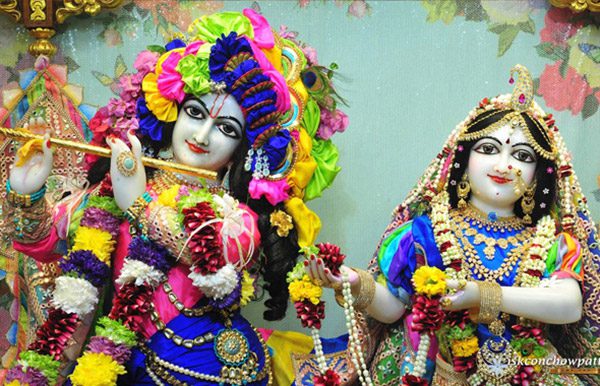
Founder-Ācārya's Excerpts
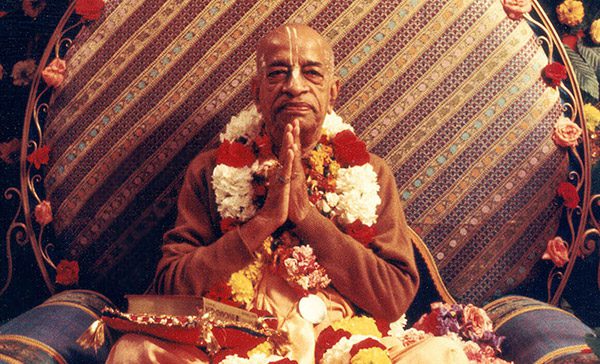
Festival Celebrations
Glimpses of Nityananda Trayodasi Festival
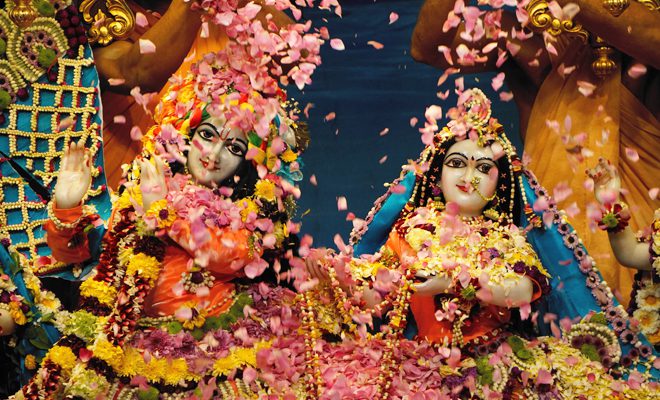
Flower Festival
Flowers have multiple uses. They’re gifted to please a loved one, used to honour dignitaries, used during wedding ceremonies, garlanded a dead body and many other purposes. Flowers are symbolic of offering respect, love, gratitude. Who is the most qualified to receive all the respect, all the love and all the gratitude? The answer to all these question is THE SUPREME PERSONALITY OF GODHEAD, SRI KRSNA.
ISKCON’s most awaited festival, the Pushya Abhishek (Flower Festival) is commemorated right at the beginning of the year in January. The first and the best flowers, which are nature’s offering to Sri Krsna, are plucked during the spring season to offer them to Him. There are approximately a thousand kilos of various flowers brought to Sri Sri Radha Gopinath Temple which include the most fragrant real roses from Vrindavan. Every year, devotees sit in the temple hall plucking the petals for the Lordships while listening to H H Radhanath Swami Maharaj’s discourse. However, due to the pandemic, the temple authorities followed the guidelines proposed by the state government and imposed restrictions for flower plucking seva this time. Yet, even in this challenging situation, the Temple managed to organise a small flower abhishek for the pleasure of Sri Sri Radha Gopinath which was accessible to everyone virtually. Taking the pandemic into consideration, there was no showering of the offered flowers on the devotees. A few devotees got together to design and stitch the most beautiful dress decorated with real flowers for The Lordships.
If you have missed watching the event live this year, do experience this most amazing and colourful eye-candy flower festival at Sri Sri Radha Gopinath Temple scheduled for next year.
Vaiṣṇava Calendar
9th – Vijaya Ekādaśī
10th – Parana Time: 6.51 am to 10.49 am;
Śrī Īśvara Purī Disappearance
11th – Maha Śiva-rātri
14th – Śrīla Jagannātha Dāsa Bābājī Disappearance;
Śri Rasikānanda Disappearance
17th – Śri Purusottama Dasa Thakura Appearance
25th – Amalaki Vrata Ekādaśī
26th – Parana Time: 06.37 am – 08.23 am;
Śri Mādhavendra Purī Disappearance
28th – Gaura Pūrṇimā – Appearance of Śri Caitanya Mahāprabhu; (Fast today)
29th – Holi;
Festival of Jagannātha Miśra
Upcoming Events

Journey of Self Discovery
A six-session course on the principles of Bhagavad Gita to quench your quest for Serenity, Purpose & Joy.
Dates: 2, 3, 4, 9, 10, 11-April
Venue: Bhaktivedanta Hall – ISKCON Chowpatty
Speaker: HG Chaitanya Lila Das
News from ISKCON World
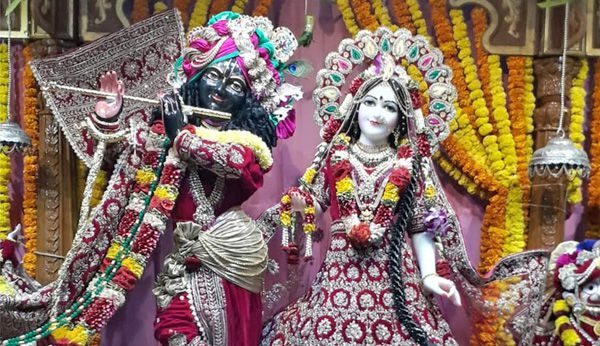
Descent of Radha Krishna at Metpally
Metpally . . . Radha-Krishna installation . . . festival . . .” Our ashram at ISKCON Chowpatty was buzzing with this discussion last week when I visited after a gap of few days. Many brahmacharis were excited about visiting this small town in Telangana, around 800 kms from Mumbai. The temple managers were busy arranging for all the essential services that had to be taken care of in the absence of so many devotees.
Ever since lockdown was imposed in Mumbai and the rest of India, most of us couldn’t step out of our ashram for more than 10 months. All our outreach programs and book distribution were confined to video calls on Zoom. Although this was a phenomenal success, resulting in the opening of several unknown avenues, we were sorely missing personal contact with devotees and celebration of Krishna conscious festivals. Upon the arrival of this invitation, therefore, all of us were eager to come out of our virtual reality and experience the physical world outside.
Metpally is mainly an agricultural town with a population of one lakh. ISKCON’s activities began here a few years ago when His Grace Narahari Prabhu from Chowpatty started preaching here. With a small group of young boys, he began his satsanga programs, which soon attracted local villagers. Many of them started taking the process of Krishna consciousness seriously and chanted Hare Krishna on beads regularly. The Sunday festivals began to attract hundreds of devotees and prasadam distribution increased manifold. The annual Ratha-yatra festivals were a huge success, and thus Hare Krishna became a household word in the nearby villages. As expected, the need for a temple was increasingly felt so that more devotees can assemble and participate in the congregational chanting of the holy names of Krishna, the prime method of religion for this age.
On February 15th, the day of Vasanta Panchami, a grand installation of Radha-Krishna deities was performed, which was attended by thousands of devotees. With the arrival of archa-vigraha, more devotees will start thronging the temple, and many will find opportunities for service. This will expand the Krishna consciousness movement even more.
I know Narahari Prabhu as a very loving devotee, expert in various skills like cooking and deity dressing. Although strict with his vows and standards, he is very sensitive and accommodative with others. He has been tirelessly working here, almost alone, for the last several years, trying to bring the message of Krishna consciousness to everyone.
Lord Chaitanya has predicted, prthivite ache yata nagaradi grama/ sarvatra pracara haibe mora nama: “In every town and village My name will be heard.” Srila Bhaktisiddhanta Saraswati Thakura used to say, prana ache yar sei hetu prachar: “One who has life (prana), he can preach.” And Srila Prabhupada, in a letter to an acquaintance, wrote, “We are interested more in preaching members than in the sleeping members.” He wanted that every devotee preach the philosophy of Krishna consciousness and try to convince people about the importance of rejecting sinful life and following spiritual life.
I feel proud that one of my close friends and godbrothers has attained such success and glory in fulfilling the mission of Srila Prabhupada and Lord Chaitanya Mahaprabhu. Although I couldn’t attend this function due to personal commitments in Mumbai, I hope to visit this beautiful town and temple one day and relish the experience of expanding Krishna consciousness.
– Mukundmala Das
Long Story Short

Ingredients of life
When we start learning alphabets they don’t make much sense till we integrate them into words.
Alphabets are the ingredients of rich words.
Similarly to cook we need many cooking ingredients, to paint we need different colours, to sing we need different tunes and the more experience and knowledge we have of the ingredients the better is the final product.
In life also getting to know the ingredients helps us deliver better.
Kids choose their experiences whom they interact with, mostly with their parents and friends of their type which deprives them of the rich learnings which comes from interacting with grand parents, relatives, kids and people not their type socially and economically
How long will the kids be isolated from meeting the real world, guiding kids to explore different genre of people will develop a repertoire of experiences.
Kids are intelligent with numbers, data, gadgets however we have seen our ability to be emotionally intelligent with a diverse set of people in our life determines our effectiveness and fulfillment.
Keep exploring and experiencing.
Our Acharyas
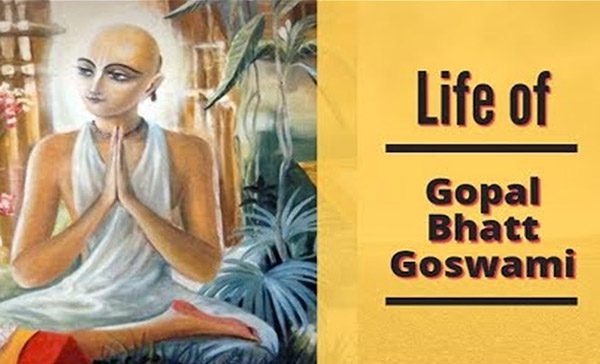
Gopal Bhatt Goswami
Shri Gopal Bhatta Goswami accepted Shrinivasa Acharya as his disciple. Srila Sanatana Goswami composed Hari Bhakti Vilasa in collaboration with Gopal Bhatta Goswami. Shri Gopal Bhatta Goswami was responsible for originating the six thesis of Sat Sandarbha later elaborately developed by Shri Jiva Goswami. Gopal Bhatta Goswami has written a foreword to Jiva Goswami’s Sat Sandarbha. He wrote a commentary on Krishna-Karnamrita. He also wrote Sat-Kriya-Sara Dipika, a guide to Vaishnava samskaras and rituals for birth ceremonies, sacred thread initiations, marriage ceremonies, sannyasa, and funerals etc. In addition to this he composed many other scriptures.
In the Gaura-Gandodesha-Dipika, Shri Kavi Karnapura Goswami writes:
Bhatt goswaminam kocidahuh shri guna manjari
Gifts of the month
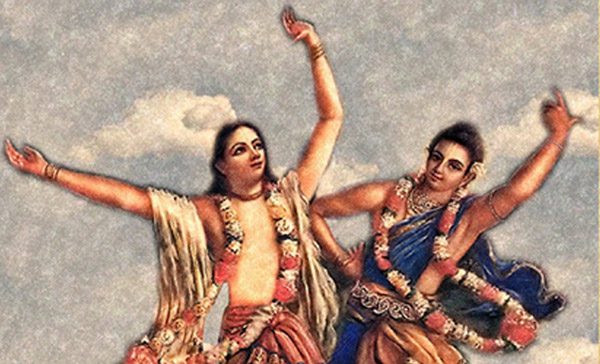
Śloka
gauḍodaye puṣpavantau citrau śan-dau tamo-nudau

Recipe – Burrito Bowl
INGREDIENTS:
For The Rice
2 1/2 cups cooked long-grained rice (basmati)
2 tbsp oil
2 tsp dry red chilli flakes (paprika)
3/4 cup chopped capsicum
1/2 cup boiled sweet corn kernels (makai ke dane)
2 tbsp tomato ketchup
salt to taste
For The Refried Beans
1 1/2 cups soaked , boiled and coarsely mashed rajma (kidney beans)
1 tbsp oil
2 tsp dry red chilli flakes (paprika)
1 cup chopped tomatoes
1/4 cup tomato ketchup
1/2 tsp chilli powder , optional Salsa Sauce as required
salt to taste
To Be Mixed Into Sour Cream
1 cup hung curds (chakka dahi)
2 tsp lemon juice
salt and to taste
Other Ingredients
4 tbsp grated processed cheese
1 cup coarsely crushed corn chips
The method for the rice:
- Heat the oil in a broad non-stick pan, add the chilli flakes and capsicum and sauté on a medium flame for 1 minute.
- Add the corn and sauté on a medium flame for a few seconds.
- Add the rice, tomato ketchup and salt, mix gently and cook on a medium flame for 2 minutes, while stirring occasionally. Keep aside.
The method for the refried beans:
- Heat the oil in a broad non-stick pan, add chilli flakes, the tomatoes, mix well and cook on a medium flame for 2 minutes, while mashing them slightly with the back of the spoon.
- Add the tomato ketchup, salasa sauce, rajma, chilli powder, salt and 1 tbsp of water, mix well and cook on a medium flame for 2 minutes, while stirring occasionally. Keep aside.
Assembling:
Just before serving, take a big serving bowl, place a portion of the rice and press it lightly using the back of a spoon. Top it with a portion of the refried beans and again press it lightly with the back of a spoon. Put a portion of the sour cream and spread it evenly using the back of a spoon. Place a portion of the rice. Finally 1 tbsp grated cheese and ¼ cup coarsely crushed nacho chips.

